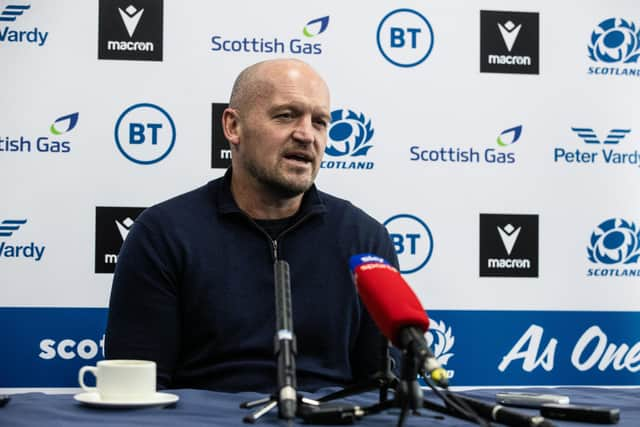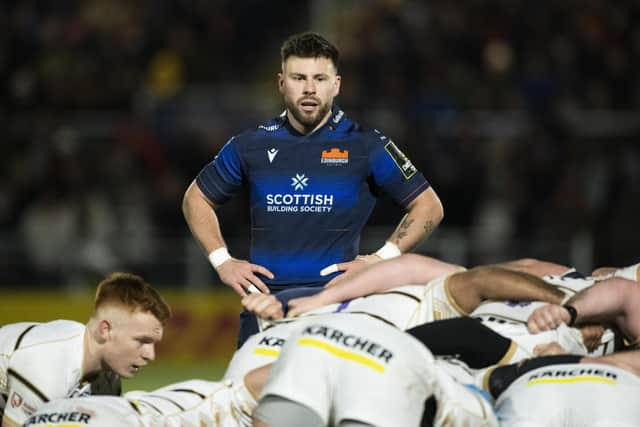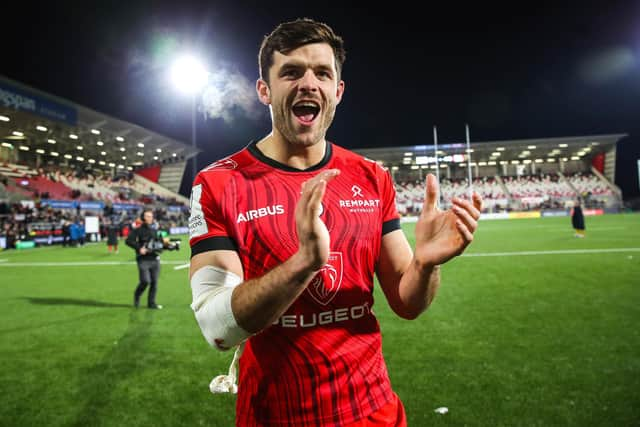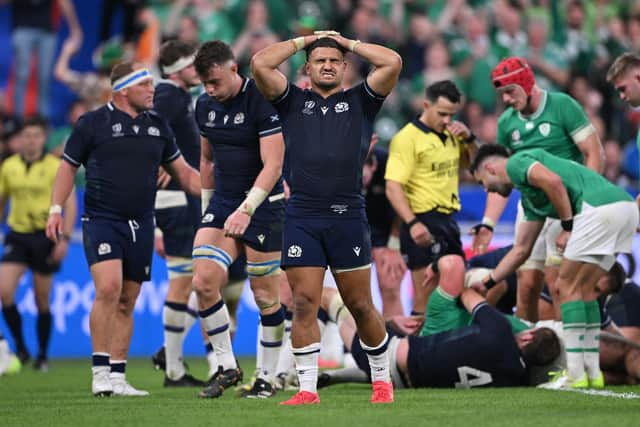Gregor Townsend holds court on Scotland: non-role in Ali Price loan, French deals, cutting World Cup feedback and getting up for Six Nations
In his first main media duties since the Rugby World Cup, Gregor Townsend sat down with journalists at Murrayfield this week as he named his squad for the 2024 Guinness Six Nations. The national coach reflected on the tournament in France in a session with Sunday newspapers in which he spelled out his disappointment at the defeat by Ireland which saw Scotland eliminated, the review process that followed and his expectations for the Six Nations which begins for his team with an away match against Wales on February 3.
He started the session by clearing up some misinformation regarding the loan deal which saw Scotland scrum-half Ali Price move from Glasgow Warriors to Edinburgh in November. The transfer was said to have taken place “after an approach was made by the Scotland national team”, something Townsend denied.
Advertisement
Hide AdAdvertisement
Hide AdGregor Townsend: “I remember Glasgow putting that out there but that wasn’t the case so I was disappointed to see that. I met Sean [Everitt, the Edinburgh coach] after the World Cup. He said we’ve got a situation here, it is looking like Scott Steele is out injured. Glasgow had three Scotland squad scrum-halves including Jamie Dobie. I believe Edinburgh approached Glasgow and eventually between Ali and Glasgow and Edinburgh and Glasgow they managed to get Ali across to Edinburgh.


“Would we support that? Of course, we would support players in our squad playing more regularly, which is what has happened. But it was completely down to Edinburgh and Glasgow, I imagine with Scottish Rugby involvement, but the process was between them.
“Ali is playing regularly, George Horne is playing regularly for Glasgow so there are real positives. I think Ali has helped Edinburgh, he’s taken to his new team almost immediately with the way he's playing. It is really good competition between the three nines that we’ve had over the last couple of years, with Ben White starting regularly for Toulon. Gus Warr is also playing regularly [for Sale], Jamie Dobie should be back in a couple of weeks, so there is a lot of competition for that position.”
Question: How’s Ben White getting on in Toulon?
GT: “It is very challenging for a scrum-half to go and play in France because a lot of the play goes through the nine. In the olden days they used to call the lineouts as well, although I don't think that is the case now. The nine is seen as more of the general than the 10, and doing that in a different language, getting used to a different way of playing, will make Ben a better player and it already has. He had a really good game a few weeks ago when Toulouse were playing Toulon and he was up against [Antoine] Dupont and played really well. I think it is going to make him a better player.”


Q: We now have Ben and also Blair Kinghorn in France. Would you like to see more Scots playing abroad?
GT: “No! Obviously it's a great move for Blair [Kinghorn] going to one of the top teams in world rugby [Toulouse]. They really appreciate players who can play in different positions. Sometimes Dupont plays at nine and 10. Thomas Ramos plays 15 and 10 more recently. Blair can also play in different positions. I think he will thrive in the way they play, which is very instinctive and he will bring his own way of playing too which I know has already impressed Toulouse. The challenge of playing in a different environment, learning a new language and what French players do with passing and running lines should make him a better player.
“From a Scottish perspective I would love for Blair to have stayed here, but from an individual development perspective, I believe this is a good thing for him. There is a balance between the individual experience and the cohesion and management of players, which has been essential to Ireland’s success. That is an element of Test rugby you can’t deny, if you have players playing regularly together and managed so they are fresh throughout the season. It is easier to take that cohesion, whether it’s from Leinster into Ireland, or Glasgow or Edinburgh into Scotland, and be ready for those big moments that come in the Six Nations or World Cups.
“If the balance is too far one way, you get players playing on a Sunday night in France and flying over, maybe missing training sessions and having to pick up relationships with players when they are maybe not in the best physical shape, so it is important you still have that balance.”


Advertisement
Hide AdAdvertisement
Hide AdQ: The Scotland team is capable of brilliant performances but what will it take for them to do it consistently across five rounds of the Six Nations?
GT: “That is what we all want but in reality, no team plays at their best level every week. Even during the World Cup there were some outstanding performances and then some disappointments, not just from us but from other teams as well. It is doing enough to win sometimes, which is important, but that is harder the better the team you are playing against.
“We talked last year about that floor and that ceiling. We know we can really raise our game to high levels but it is making sure we don't drop below that certain level. This team has grown towards that over the last 12 to 18 months and this is just another five games to test ourselves over the next few weeks.”
Q: How has the post-World Cup review process worked?


GT: “There have been different streams of review. We always ask the players for anonymous feedback so they can be open in certain areas of our game and preparation and most players contributed to that. We had further talks with key players. Our own coaching group review things and have the opportunity to review things over a longer period of time. There was a review conducted by Scottish Rugby that included coaches, staff and players that Mark [Dodson, chief executive], John [Fletcher, head of pathways] and Jim [Mallinder, performance director] were driving. There’s plenty of information and learning that came out of it which is the right way to do it. We need to know what went right and what we need to build on and what didn’t go right. Not just on the Six Nations but for the next World Cup to produce a template for where the guys were in great physical shape and playing well but these are the things we believed in but didn’t get right to achieve what we wanted to achieve.”
Q: Can it be a brutal process at times?
GT: “Yeah, at times. Among the coaches there can be a lot of debates and discussions on big points but also on things around our game and how we set up our week. When we see players’ feedback it can sometimes be positive and sometimes be cutting and you’ve got to take both on and talk it through and say ‘is this something we need to change about our preparation or our game?’ So I believe we will be much stronger for the experience but the proof is how we perform in Cardiff and back it up in the four games after Cardiff.”
Q: This is your seventh Six Nations as head coach. How have you coped with the challenge of getting yourself back up for it?
GT: “I was really disappointed with how the World Cup ended because there were so many positives, and not just from a rugby point of view but off-field because it was a brilliant tournament. Spending time with the players and where we were in France and the reaction the players showed after South Africa, because we went in at half-time believing we could win that game and we didn’t and had to wait another two weeks [before the next match]. But they were outstanding against Tonga. And the Romania game was maybe not the biggest challenge but they did the job. It’s not like Scotland teams in the past had really put a team away. So it’s never going to be perfect but up until that Ireland game there was good and bad but the response to the bad was there and how the players were training and getting on with each other was brilliant but the big disappointment was the scoreline and how the game went away from us so quickly against Ireland.
“You’ve got to compartmentalise that one performance and learn from it but also the fact we did enjoy the World Cup. It was great to see so many Scotland fans out there.
Advertisement
Hide AdAdvertisement
Hide Ad“It’s tough when you have to wait so long to get the group back again but I’m used to it now, there’s big gaps in our season. But what we have done as a coaching group which has been really refreshing is the learning our coaches have conducted since the World Cup which has been great. Steve Tandy was out with Melbourne Storm for three weeks, working with them during pre-season and has come back refreshed and feeling that he’s going to add a couple of things to our defence from working with one of the leading rugby league teams in the world. John Dalziel, Pete Horne and Pieter de Villiers have been at Racing, Toulouse, Stade Francais, Bath, Harlequins and they’ve got around to see different environments and see if there’s stuff that works with those teams that we might add or just be able to come in and challenge our views so that’s been refreshing. They’ve come in and been re-energised with that experience.”
Comments
Want to join the conversation? Please or to comment on this article.
